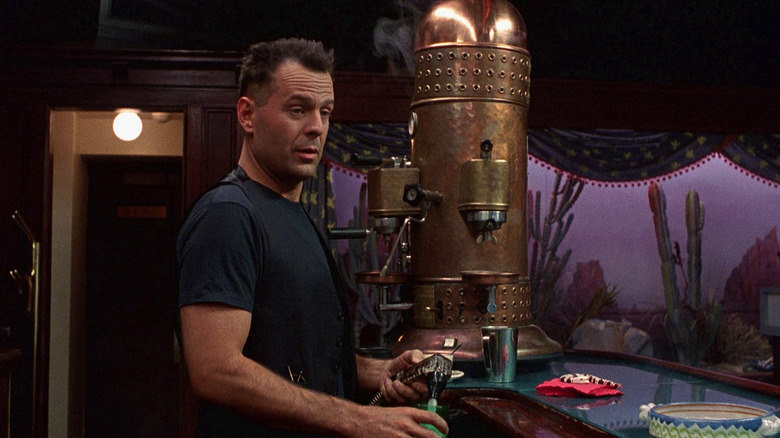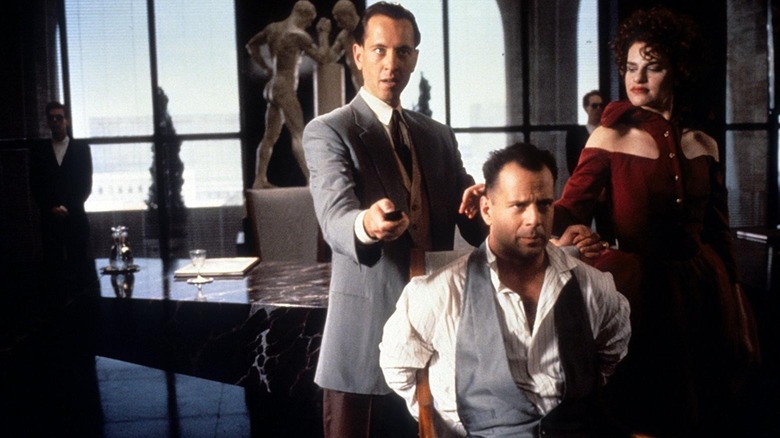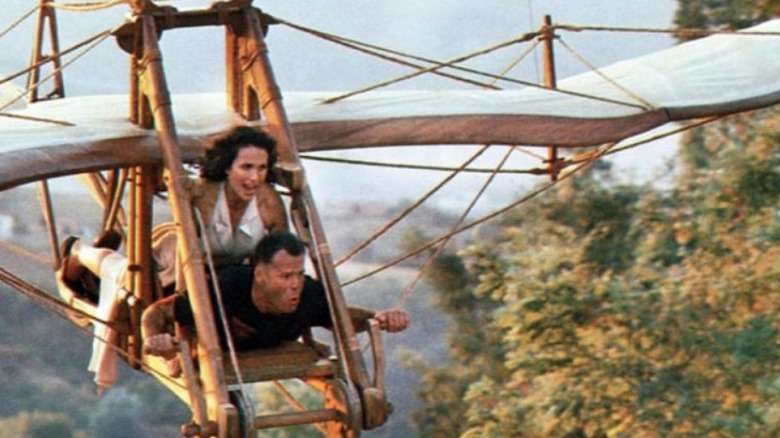Bruce Willis Takes Pride In One Of His Most Notorious Flops
Prior to its release in 1991, there was every reason to believe that Michael Lehmann's heist comedy "Hudson Hawk" would be a hit. It was written by star screenwriter Steven E. de Souza, who had already had gigantic success with film like "48 Hrs.," "Commando," "Jumping Jack Flash," and "The Running Man." His biggest smash was "Die Hard" in 1988, and he was tapped to write the sequel two years later. "Hudson Hawk" would re-team de Souza with "Die Hard" star Bruce Willis, and the film would boast performances from Danny Aiello, fresh from "Moonstruck," as well as James Coburn, Richard E. Grant, Sandra Bernhard, and Andie MacDowell. Lehmann, meanwhile, also had a big cult success in 1988 with "Heathers." Never mind that his bonkers mutant-bug movie "Meet the Applegates" bombed in 1990. The sensibility was there.
"Hudson Hawk" is an odd duck. Willis plays the titular cat burglar, freshly released from prison, who is once again roped into stealing high-ticket items from vaults and museums. He becomes embroiled in a blackmail plot that involves a pair of eccentric millionaires (Grant and Bernhard) and pieces of a crystal that once belonged to Leonardo da Vinci, which is said to possess alchemical powers. There are cartoonish chase scenes, a squadron of assassins named after candy bars, and a wicked butler with swords hidden up his sleeves.
"Hudson Hawk" tanked. It was made for $65 million, but only grossed $17 million domestically. Critics also largely panned it, and it was nominated for a few Razzies. For years, "Hudson Hawk" was used as a punchline, an example of one of the worst bombs of all time. Adjusted for inflation, it lost over $100 million.
Having seen the film, the extreme reaction seems strange. Many of those who saw "Hudson Hawk" liked it, including an interviewer from the Huffington Post who talked with Willis about his career back in 2012. The interviewer brought it up, and Bruce Willis announced that he still takes pride in the project.
Bruce Willis still likes Hudson Hawk
"Hudson Hawk," by the way, is a blast. It's cartoonish and energetic, and features some very funny, over-the-top performances from some very committed actors. It's one of those movies where everyone, including the title character, is wildly eccentric. For example: one of Hudson's quirks is that he has memorized the exact running times of hundreds of pop songs. When he and his crime partner Tommy (Aiello) stage a heist, they time out their movements by singing old standards. An early heist seems them crooning "Swingin' on a Star" to themselves.
Willis knew it was a broad comedy from the jump, and despite its initial failure, he really loves the film. He said:
"I like it a lot. I still take pride in that film. it was just a little outside the realm of what people [expected]. You know, some people come to the theater and they go, 'I only want to see him do this kind of film.' [...] It was satire. We were trying to make each other laugh — make the actors laugh. We had a really funny cast. A lot of people didn't get to see the film because the critics chose this picture to, you know, take the trash out on."
Willis, perhaps predictably, takes a dim view of critics, saying that every so often, critics will dogpile on a certain film for no reason. And he has a point. There can be something of a "blood in the water" mentality around certain films, and both the press and the public will select a feature — sometimes legit bad, but sometimes good — and decide that it's emblematic of Hollywood's worst habits. One might recall the same thing happening with "Gigli." Or, more recently, "Morbius." Bad films, yes, but hardly the nadir of cinema.
Hudson Hawk made its money back, and then some
The reason "Hudson Hawk" was so crazy was because Willis was able to take over the production, sort of. As described in a /Film article, Willis once received a phone call from Warner Bros., informing him that his then-unreleased film "The Bonfire of the Vanities" was testing remarkably well, and that audiences loved the Willis character. Warner Bros. decided to re-cut "Bonfire" to give Willis more screen time.
This gave Willis a sense of entitlement with "Hudson Hawk," which was still being written at the time. Willis decided that de Souza's script needed to be weirder, and Dan Waters was brought in to write newer, stranger drafts. "Hawk" producer Joel Silver hated that his lead actor pretty much took over the movie, and even de Souza wasn't really able to rein in Willis' every strange impulse. As such, Willis more or less had creative freedom to make the film he wanted. And what he wanted was wild, crazy, energetic, and musical.
"Hudson Hawk" may have bombed in theaters domestically, but it did decently overseas, earning back most of its budget. It also found a new audience on home video, which is where most of its enthused fans discovered it. Four years after its release, "Hudson Hawk" was still turning a profit on VHS, and it began to grow in estimation on the midnight movie circuit. Willis said to the Huffington Post: "I hear it referred to as a cult film, still. And from a studio's point of view, the film is in profit."
Perhaps ironically, "The Bonfire of the Vanities" also bombed, but hasn't yet received a positive re-litigation.


